
Publisher:
Bonnie King
CONTACT:
Newsroom@Salem-news.com
Advertising:
Adsales@Salem-news.com

~Truth~
~Justice~
~Peace~
TJP
May-14-2011 01:44

 TweetFollow @OregonNews
TweetFollow @OregonNews
Update on Counter-Piracy Operations
Salem-News.comStatus of seized vessels and crews in Somalia, the Gulf of Aden and the Indian Ocean.
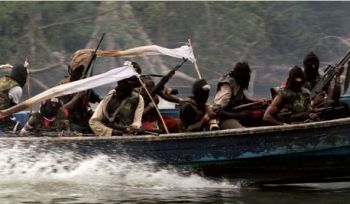 Pirates photographed near Somalia |
(NAIROBI, Kenya Ecoterra) - ECOTERRA Intl. and ECOP-marine serve concerning the counter-piracy issues as advocacy groups in their capacity as human rights, marine and maritime monitors as well as in co-operation with numerous other organizations, groups and individuals as information clearing-house. In difficult cases we have successfully served as mediators.
STATUS-SUMMARY:
Today, 13. May 2011, 23h30 UTC, at least 46 foreign vessels plus one barge are kept in Somali hands against the will of their owners, while at least 725 hostages or captives - including a South-African yachting couple as well as a Danish yacht-family with three children and two friends - suffer to be released.
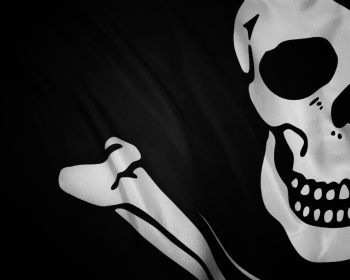
But even EU NAVFOR, who mostly only counts high-value, often British insured vessels, admitted now that many dozens of vessels were sea-jacked despite their multi-million Euro efforts to protect shipping.
Having come under pressure, EU NAVFOR's operation ATALANTA felt now compelled to publish their updated piracy facts for those vessels, which EU NAVFOR admits had not been protected from pirates and were abducted.
EU NAVFOR also admitted in February 2011 for the first time that actually a larger number of vessels and crews is held hostage than those listed on their file.
Since EU NAVFOR's inception at the end of 2008 the piracy off Somalia started in earnest and it has now completely escalated. Only knowledgeable analysts recognized the link.
Please see the situation map of the PIRACY COASTS OF SOMALIA (2011) and the CPU-ARCHIVE ECOTERRA members can also request the Somali Marine & Coastal Monitor for background info.
- see also HELD HOSTAGE BY PIRATES OFF SOMALIA
and don't forget that SOMALI PIRACY IS CUT-THROAT CAPITALISM
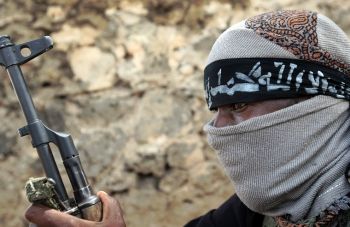 From Boston.com |
WHAT THE NAVIES OFF SOMALIA NEVER SEE:
http://www.boston.com/
What Foreign Soldiers in Somalia and even their Officers Never Seem to Realize:
PEACE KEEPERS OR BIOLOGICAL WARFARE AGENTS ?
SG Ban Ki-Moon (UN) and President Ram Baran Yadav (Nepal) should resign and take the responsibility for 4,500 Haitians having been killed by a Cholera strain introduced by so-called UN Peace-Keepers into Haiti.
LATEST:
STILL OVER 700 SEAFARERS HELD HOSTAGE IN SOMALIA !
While billions are spend for the navies, for the general militarization or for mercenaries or conferences, still no help is coming forward to pacify and develop the coastal areas of Somalia. Solutions to piracy have to tackle the root causes: Abhorrent poverty, environmental degradation, injustice, outside interference. http://www.stopthehunger.com
Updates on known cases of piracy - pls see also below this latest news in the status section.
ALERT
ANOTHER OPERATION CREEP ???
EU-BOOTS ON THE GROUND IN SOMALIA ??? (ecop-marine)
Covered as "intervention against the Somali pirates" the Dutch Minister for Defence, Hans Hillen, developed the "idea" in front of the KVBK, the Dutch "Royal Society of Science and the Art of Warfare on Wednesday (May 11).
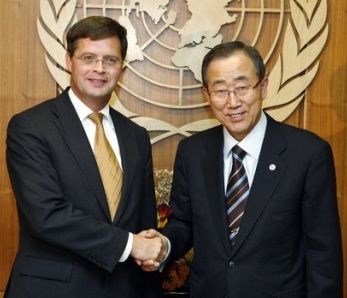 Hillen and UN Sec. General Ban Ki Moon |
Several countries seem, so the minister, to be in favour of such an action against the pirates in Somalia, which would be characterized by military incursions on the ground in Somalia to attack the bases of the pirates, was reported.
Hillen added that the Netherlands, with Germany and the United Kingdom, will make a proposal in this direction together with their European counterparts in June. The German Ministry of Defence, however, did so far, not confirm that such a plan exists.
Reportedly the Dutch Minister, though he is not even the Commander of the Armed Forces of the Kingdom of the Netherlands, stated that "the EU attacks currently only the symptoms" and explained "one will need, if need be, to re-examine the rules of engagement.” "Who is one?" many ask.
Minister Hillen from Holland, a former sports journalist who came to power via the Christian Democratic Appeal (CDA) - the centre-right Dutch Christian democratic political party, tried to immediately calm down critical voices with his insurance that this would not not be a question of a permanent engagement. He also tried to explain that there is no need for being on the ground in a permanent way, “just temporarily,” he said. Observers stated that they had "heard this line one time too often" to believe it.
But it transpired that work on this plan seems to have already been commenced. Apparently a discussion already took place within the military committee on this subject and the commander of the EU NAVFOR operation Atalanta, Buster Howes, shall present a draft amendment of the Operational Plan and the rules of engagement, which could then be discussed between the EU ministers of defence at the next council meeting and between the Foreign Ministers.
It appears that corporate oil pushes their vassal-governments now also in Europe more and more to come to terms with Somalia, where strong interests of Royal Dutch Shell, British Petroleum and French Total supplement the cravings of U.S.American Conoco, who all have already in the past created political havoc leading to inter-clan fighting in Somalia.<
The Federal Republic of Germany has very clear rules of engagement concerning their navy's anti-piracy operations - under whatever conglomerate command - and these were, are and also would be with respect to any changes subject to the approval by the German parliament - the Bundestag.
Observers therefore wonder which signals Hillen might have received - according to the Dutch minister obviously coming from the new German Federal Minister of Defence and Commander-in-chief of the Bundeswehr, the German armed forces, Thomas de Maizière. If at all, they have no backing by the German parliament nor the German people, who also opted out of the Libyan adventures their oil-hungry EU partners so forcefully engage in. Incumbent Thomas de Maizière succeeded resigned Karl-Theodor zu Guttenberg just this year and the actual work of fighting crime including piracy is the duty of the police in Germany - not the military.
PRINCIPIIS OBSTA !!!
Though persistently coerced by so-called allies to engage in the global war-fares of the corporate-industrial military complex, the German people still have enshrined in their basic law the here statute:
"War must never again be launched from German ground!"
(VON DEUTSCHEM BODEN SOLL NIE WIEDER KRIEG AUSGEHEN !)
The naval war-games in Somali waters must stop and Somali piracy as well as the heinous crimes of hostage taking must stop too. But it must be brought to an end by coastal community development and the strengthening of Somali institutions carried by the Somalis as well as by enhancing the self-healing, self-determinating an self-governing forces of the Somalis and for the Somalis. Help is needed, not masterminds and certainly not more foreign military boots on the ground.
SOMALIS SAY: ALL FOREIGN TROOPS AND INSURGENTS MUST GO OUT OF SOMALIA AND OUT OF THE SOMALI WATERS!
OUTLOOK
EU's "Boots on the ground" ideas, the Indian lobbying for a naval operations in Somali waters under UN high-command and the renewed attempt to mess with the Somali 200nm EEZ, which was declared and established since Somalia signed UNCLOS under the condition that Somali Law No 37 of 1972, which rules the 200nm territorial waters of Somalia, would prevail, while risking with a new or "re-declaration" of the EEZ that all claims concerning illegal fishing of foreign fleets, for damages due to toxic dumping by foreign Mafias and the other atrocities committed in the Somali seas since 1991 could no longer legally be pursued, and also is just following the solely U.S.American idea that no state should have territorial waters of more than 12 or 24 miles.
Thereby Somalia would be giving in to the hegemonial policies with canon-boat-politics of global powers as enforcement of the "New World Order". This paints a bleak picture for the Somali sovereignty, if the Somalis would not stand up now and drive the corrupt part of their officials back to where they came from with their foreign passports.
The people of Peru were much more wise to enshrine their 200nm territorial waters in their constitution, which can not so quickly be forged or altered by corrupted and corrupting officials.
The stipulations of Somali Law No. 37 are of course also is missing in the UN-mastered draft constitution, which nobody in his or her right state of mind can consider now as an outcome of a democratic Somali-led process of the Somali people at large.
FV Prantalay 12 still in pirate hands (ecop-marine)
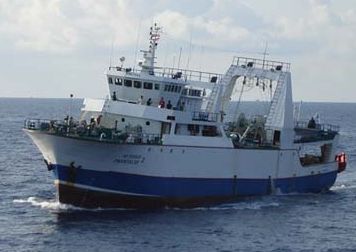 The FV Prantalay |
NATO, who had earlier stated that the release of the FV Prantalay 12, the last of a group of three fish-poaching vessels of a Thai fleet, "would currently take place", while we reported that it is still at the same location with its crew as hostages, reiterated now and rephrased:
FV PRANTALY 12, although still in pirate possession, is no longer in a seaworthy state and, according to a pirate statement, will be returned without ransom payment in due course.
Also a statement by a certain Somalia website that the vessel had been released is not correct.
However, it is interesting to note that NATO seems to have direct contacts with the Somali pirates - something which ship-captains and analysts claimed since long, since they had observed specific pirate attacks under the watch of naval vessels with no response from the official watchkeepers.
Other observers reported from Galkayo that the Somali broker, who earlier had disappeared with the ransom money for the release of the Prantalay fleet, is back in town.
FV Prantalay 12 recently left for a piracy mission, but came back without having achieved anything and is now used as supply vessel for the other hostage ships.
Details of how and under what circumstance Taiwanese fish-poacher and piracy-launch FV JIH CHUN TSAI 68 and a dhow the navies called "JELBUT 24" have been retaken from the pirates have not yet been made public by the naval forces involved, which did already lead to speculations about numerous cases of fatalities among the crew and the Somali captors.
U.S.A.-Lackeys or Lusting NWO Spearhead ?
India should first of all control its own smuggling and blockade-breaking fleet - aiding fundamentalists and robbing Somalia by illegal exports - before playing the stirrup-holder for such kind of "UN-Marines" - or are Indians ready to pay for them this time themselves and without their "foreign aid"?
India seeks UN-led anti-piracy force (IANS)
India has expressed the need for a UN-led anti-piracy force off the coast of Somalia and other piracy-affected regions to reinforce the efforts of the littoral states affected by the scourge.The navies of several countries, including India, are already operating in the piracy-affected regions under several commands. "A UN-led naval force could provide a more equitable, efficient and better co-ordinated protection to all ships, notwithstanding their flag, the nationality of the sailors or cargo distribution," a representative of the Indian delegation said at the 89th Maritime Safety Committee meeting of the International Maritime Organisation in London Wednesday, according to officials here.
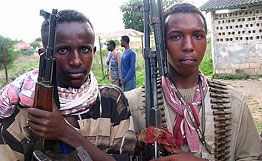
The three-member delegation representing India noted that if UN peacekeepers are accepted and utilised in enforcing peace on land, there is no reason why UN peacekeepers on the seas should not be an acceptable concept.
Besides, India emphasised the need to seriously consider steps for effective sanitisation of the Somali coastline.
"All vessels, irrespective of their type or size leaving the Somali coast may be monitored through tracking devices. We also need to identify shipping lanes and earmark buffer zones as 'no-go areas' for all vessels, barring bonafide merchant traffic," the Indian delegation said.
India further urged the need to complement the efforts of the navies at sea by focusing on pirate leaders and financers as the pirates caught at sea are merely the foot soldiers, driven essentially by poverty ashore.
"It is the financiers and pirate leaders that need to be tracked and hunted down by following the money trails that fuel their operations. It is time that we recognize that piracy has become an internationally organised crime and needs to be tackled as such. This will involve sharing of intelligence, profiling of the pirate groups and identification of their facilitators inside Africa and on other continents," the Indian delegation said. It noted India has a round-the-clock maritime administration communication centre which closely co-ordinates with all Indian interests, the Indian Navy and other relevant agencies in the region to obviate piracy incidents.The centre also shares and disseminates piracy-related information to all Indian interests and the international co-ordinators.
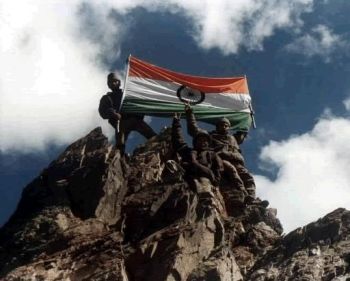 Indian Army |
The Indian delegation pointed out that anti-piracy measures have been made mandatory on all Indian ships transiting through the piracy-infested waters, while the Indian Navy provides escort to convoys of ships of all countries - over 1,400 since 2008.
They also regretted that the 'War Zone Limits' have been extended beyond the existing boundary of 65 degrees East longitude to 78 degrees East, or right upto the territorial waters on this country's western coast, adding this has a direct implication to the transaction cost of commodities to the Indian ports.
The delegation urged that since there have been no piracy attacks reported for the past two months within 500 nautical miles from the Indian coast, it is imperative to reduce the eastern boundary of the war zone to an appropriate longitude if not brought back to the earlier limit of 65 degrees East.
An official of the Directorate General of Shipping released the opening remarks made by the Indian delegation at the conference, but could not identify the officials who spoke on the occasion.
[N.B.: ECOTERRA Intl. calls many of the death-cases which occur in the piracy- as well as in the anti-piracy-circus EXTRAJUDICIAL KILLINGS - if not outright murder - and has requested already several times that thorough investigations have to follow each incident and the findings to be made public. The UN must be held fully accountable for upholding the believes in the navies that they would act legally and must account for each and every act committed under their banner. All acts committed by Somalis as well as all acts committed by the navies must be scrutinized with the same impartial zeal to let justice prevail.
Without a declaration of war by any nation of the UN and or by any of the states sending those navies, who are hiding behind illegal UN resolution constructs, these nations are waging war against the majority of innocent Somali people and are committing murder with impunity, while neither the sates nor the UN or the Somali governance are following up.
Only in rare cases the real culprits of piracy and crimes committed on the High Seas or in the territorial waters of Somalia are brought to to book. The UN and all the navies are betting on the fact that the Somalis - a majority being illiterate - do not have the knowledge and means to legally follow up on cases of outright murder and illegitimate warfare, and know that the present Somali governance is not in a position to defend the Somali people against any aggressor or injustices brought against them by foreign hands. The UN and the navies have lost their moral standing by not investigating these acts.
The present call by India to place the naval actions around the Horn of Africa - often leading to outright atrocities - under another layer of "governance" - here the UN - is only an attempt to be able to operate with impunity without being ever held responsible. Such must be objected right from the start. The numerous war-crimes committed by so-called peacekeepers in Somalia during operation Restore Hope and UNOSOM I and II are not forgotten.]
India opposed to extension of piracy 'risk zone'
(AFP) India is opposed to extending a piracy "risk zone" to the edge of its territorial waters, the country's maritime regulator said on Friday, as pirates seek new targets beyond the Horn of Africa.The extension, brokered by the International Transport Workers Federation with ship owners and managers, came into effect on April 1 and is designed to protect sailors and vessels at risk of attack.
"It (the zone) is extended up to the Indian coast and we don't think that that is the right thing to do," Captain H. Khatri, a deputy director-general of shipping at the Directorate General of Shipping in Mumbai, told AFP.
"There are no piracy incidents in these waters so it shouldn't be an issue," he added.
The extension provisions include increasing security on ships traveling in the area to reduce the risk of attacks and paying compensation to seafarers if their vessel is targeted or if they are injured or killed.
An agreed "high risk zone" with similar terms lies off the coast of Somalia, where an international force is patrolling to protect shipping in the busy maritime corridor.
India's opposition to the extension comes as the country's coastguard and navy are on high alert against pirates seeking to evade the clutches of the international force by attacking shipping in the eastern Indian Ocean.
More than 100 pirates have been caught and are awaiting trial in India following a series of violent skirmishes near the country's Lakshadweep islands since the start of this year.
Last week, an Indian navy reconnaissance aircraft forced pirates to flee as they attempted to hijack a Panamanian-registered cargo ship about 800 kilometres (500 miles) off Mumbai.
Somali Piracy Is the Hardest Way to Make an Easy Living
By Adam Martin (TheAtlanticWire)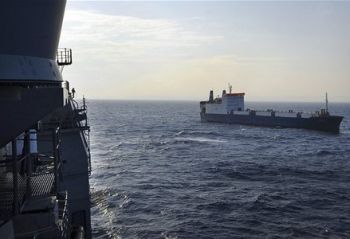
Somali pirates grab headlines by hijacking multi-million-dollar ships and holding them and their crews hostage for more millions of dollars. They also live in a country that has one of the lowest per-capita gross domestic products (around $600).
But your average successful pirate makes what in the United States would be a comfortable, middle-class living. A report from the consulting firm Geopolicity found a pirate could make between $33,000 to $79,000 per year -- about 150 times the national average wage.
Of course, that relatively high income comes with a pretty short life expectancy: The report suggests a pirate can make $168,000-$394,000 over a career. That comes to about five years. But it's enough to make the trade attractive to a fast-growing population of Somalis. The number of pirates operating in the area is expected to double by 2015. The total cost of piracy in the Indian Ocean during 2010 was somewhere from $7 billion to $12 billion, and is expected to hit or top $15 billion by 2015.
"This bill includes ransoms, insurance payments, the cost of naval operations, prosecutions and of rerouting ships," points out Christine Mungai in Business Daily Africa.
It's interesting to note that doubling the number of pirates doesn't double the projected expense. Obviously, there's a finite number of ships that can be hijacked, and many joining the trade will probably join an existing gang that will become more successful but not doubly so.
Back in February, pirates shot and killed an American family of four on their yacht. That got many asking whether and how pirates should be tried. The question's not a simple one, as Somalia has been without a government for about 20 years, and can't host trials itself. In April, a Somali pirate on trial in the United States got a 25-year prison sentence, and another was arrested in a Washington D.C. airport. But the United States can't host the world's piracy trials because it doesn't have the money or jurisdiction. The British government has reportedly pledged close to $10 million to support surveillance and enforcement along the Somali coast, but there is no international solution to this growing international problem.
[N.B.: The cited report to which the author refers had been criticized by a multitude of authors already and people should concentrate on fact, not fiction or speculation.]
... AND FOR THE "SECURITY"- AND MERCENARY BUSINESS TOO!< Rich Returns for Somali Pirates Evading Capture in Gulf of Aden By Robert Young Pelton (*) (Bloomberg-Businessweek)Tucked behind the shouting dockworkers and fishermen cleaning their nets at the wharf in Bosaso, on the Gulf of Aden in Somalia, there’s a row of decrepit gray skiffs and patrol boats.
Strewn with rusted anti-aircraft shells and old mattresses, these dead ships look more like floating homeless shelters than vehicles of terror. Out on the water, though, they played a starring role in a booming criminal enterprise. These are the impounded attack vessels used by Somali pirates to hijack passing cargo ships, private yachts, and even oil tankers.
Drive a few hundred yards west along the beach, and there, just past the presidential compound, is a well-worn and crowded jail, with 248 pirates among its 400 prisoners, Bloomberg Businessweek reported in its May 16 issue.
Abdirahman Mohamed Farole, the president of Puntland, insisted that I visit the prison to prove that his tough stand on maritime kidnappers was not just talk. Somalia has not had an effective central government since 1991, and Puntland is one of its seven autonomous regions. Minutes after entering the prison, I met 51-year-old Farah Hirsi Kulan, or “Boyah.”
Halfway into an eight-year sentence for piracy, Kulan lounged outside a packed cell block with another famous bandit, Omar Bagaley. A newly arrested 13-year-old, Saynab, sat wedged between Bagaley’s knees on a concrete slab.
False Promise
Back in November 2008, Kulan was the first public face of Somali piracy. Not only was he the region’s chief scoundrel -- he had coordinated the seizure of 25 ships, as he boasted to the BBC in 2009 -- Kulan began a second career as a “reformed” pirate, advocating for pirates to quit, stop the violence, and go to the mosque. Some believed him, until Kulan was apprehended while fleeing a major pirate planning meeting in Garowe, Puntland’s central city, and thrown in jail.
Our conversation was brief and loud. Bagaley stabbed the air with his finger, warning me and my interpreter to back off, while Kulan insisted he had ceased to be a pirate before his arrest and was merely a fisherman, enlisted to repel poachers.
What money he earned, he shared with friends. This is a common refrain among Somali pirates: that they’re just poor fishermen taking up arms to defend the seas from the predatory practices of foreign poachers. Some will tell you they go to sea to prevent toxic dumping like Greenpeace.
Unglamorous Cargo
The UN Monitoring Group on Somalia estimates that 6.5 percent of the attacks by gangs of Somali men have been against fishing vessels. According to the International Maritime Bureau, or IMB, a London-based not-for-profit group specializing in global commerce, the estimated $150 million to $300 million in ransom money paid out last year was provided to free the crews of bulk carriers, container ships, and other vessels carrying unglamorous and lightly protected cargo.
Some of that was paid to recover private yachtsmen. And while a pirate’s take may trickle down to friends, President Farole said most burn through cash conspicuously on Land Cruisers, lavish parties, and a steady supply of qat, a mild stimulant chewed like tobacco and imported from Kenya.
Saynab, the 13-year-old would-be pirate, clearly admired his elders in the yard. His implausible story was that he set sail with the pirates to learn how to fish.
It was Friday, and he was being visited in jail by his 32- year-old mother and two-year-old brother. His mother blamed herself for Saynab’s predicament.
“I only started looking for him 22 days after he disappeared,” she said. “I thought he just sailed away.”
Waging War
Later that afternoon, when I mentioned Kulan and Bagaley to Farole, laughter broke out in the room. “They think they own the world,” Farole said.
In his third year as the leader of Puntland, the former banker and doctorate candidate at Melbourne’s La Trobe University has stepped up his war on the pirates with plans that combine community activism with a new law enforcement group funded by an anonymous donor.
In the past 90 days, Farole says, pirates have been pushed from fishing ports to Puntland’s smaller communities. Elders and residents of coastal towns such as Eyl, Bargal, Laasqoray, and Bosaso have all taken stands against the brigands and their followers. Pirates are forbidden to come ashore, store owners are banned from selling goods to pirates, and pamphlets declare their money to be “haram,” or against the tenets of Islam.
Powerful Draw
Despite the imported firepower and the support of residents, Farole’s dismissal of Kulan may be years premature. The idea of sailing off to find riches and adventure is a powerful draw, especially for young men with few employment options. When the president hears about the gullible teenager sitting in prison, he is visibly disturbed.
He turns to his ministers in the room and says, “Get him out of there: Piracy is no business for a child.”
Piracy is a crime, but it is above all a business, and right now it’s a high-volume one. The UN Office on Drugs and Crime reported that 1,011 pirates are on trial or in jail in 20 countries, and neither deadly military responses nor harsh sentences have slowed the attacks or piracy’s spread.
There have been 97 pirate attacks in the Somali region in the first quarter of 2011 out of 142 worldwide, according to the IMB. That’s up 177 percent from a year earlier. At the moment, more than 480 people are being held hostage on more than four dozen ships in Somali waters, all awaiting ransom and rescue.
Tanker Ransom
Business is booming, in part, because ransoms keep getting larger. On April 7, Intertanko, an organization of independent tanker owners, reportedly paid $13.5 million for the release of its Very Large Crude Carrier Irene SL, topped up with 1.8 million barrels of Kuwaiti crude.
The $200 million worth of oil didn’t interest the hijackers. Instead, they used the 1,000-foot-long tanker as a destroyer-class warship. European Union Naval Force, or EU Navfor, which tracks piracy from its U.K. headquarters, reported that the Irene SL pulled up alongside freighters as pirates fired down on their victims from the tanker’s hull.
To score their $13.5 million payout, the pirates held the Irene SL’s 25-man crew for 58 days. That two-month investment netted them a 26,900 percent return on estimated expenses of $50,000, according to Andrew Mwangura, maritime editor of Somalia Report. More typically, Mwangura figures, crews raise $300,000 to chase a $4 million ransom.
Shipping companies ballpark the impact of pirates on their trillion-dollar shipping business at $7 billion to $12 billion per year, according to Ocean Beyond Piracy figures presented at a Dubai antipiracy conference in April.
Gulf of Aden
Some 23,000-plus vessels pass through the Gulf of Aden annually. This includes tankers carrying 40 percent of the world’s crude oil. Running a decent-size cargo ship costs $15,000 to $50,000 per day, according to Hart, a British-owned security firm with offices in Singapore, Cyprus, and the United Arab Emirates, among others.
A cargo ship will typically make the Gulf of Aden passage in three days. It would take a similar ship three and a half weeks to go around the Horn of Africa.
Ironically, piracy in the Gulf of Aden partially grew out of efforts in the late 1990s by the same Hart security outfit to train Somali militias as a self-sufficient coast guard. When the Puntland government fell in 2000, the transition from coast guard to piracy took about a day.
Enterprising sailors such as Boyah and 38-year-old Mohamad Abdi Garaad grabbed guns and began boarding unsuspecting fishing vessels operated by Thai, Spanish, and Chinese companies, demanding “fines” of $20,000 to $50,000.
Early Piracy
A ship could be released if money were paid to a member of the Somali diaspora anywhere from London to Nairobi. Payment confirmed, the ship and crew were sent on their way. Initially, some of the militia discipline held, and any pirate using violence or damaging the ship would be fined or kicked out.
This early piracy still seemed like a tabloid hoax, at least until 2005, when Somali coast guards hired to protect a Thai fishing boat, the Sirichainava 12, seized the ship and demanded $800,000 for its release.
The mutineers were overpowered, but the idea stuck. Why accept cash to protect ships when it was just as easy to demand a ransom? In 2006, there were 10 to 20 reported piracy attacks. The next year they doubled, and ransoms climbed to $1.5 million.
Using funds from successful hijackings, pirates poured the money back into ships and crews, and in 2008 piracy began in earnest. That year there were 134 pirate attacks and 32 hijackings. It was also the year that the first oil-carrying supertanker, the Sirius Star, was pirated, an act that caught the attention of terrorism analysts and military planners.
Main Groups
At present the IMB and Navfor believe there are 10 principal pirate groups, some operating with more enthusiasm than professionalism. After a number of violent responses to piracy by the world’s navies, the trade is becoming even uglier.
On Feb. 19, four Americans on a round-the-world trip got caught up in a botched rescue attempt and paid with their lives. At least three Danish children were being held hostage even after the ship they were held on had been returned to its owner.
One reason for piracy’s rise is that, while the risks of prison and death are high, it’s easy for startups to gain market share. All you need is a fishing boat and a relationship with one of the “big three” money men -- or a relationship with someone who has a relationship.
If you have successfully grabbed ships in the past and have a decent crew, one of the big three, known by their nicknames, Boyah, Garaad, and Afweyne, will back you for 50 percent of expenses. Then you need to canvas the eight small backers who are good for 25 percent. In all, it takes around $300,000 for a solid run, according to Mwangura at Somalia Report.
Expenses List
Expenses break down as follows: weapons and ammo ($2,000); skiffs and outboards ($14,000); grappling hooks and curved ladders ($1,200); GPS and radios ($4,000); food ($70,000); miscellaneous equipment ($30,000); bribes ($180,000). Once you take hostages, allot $15,000 to pay the land crew to watch over them and the hijacked ship.
Ambitious pirates use rusty skiffs to board and control a “mother ship,” a larger vessel that can deliver a good ransom but can also provide fuel, food, water, and shelter as a staging platform for more attacks farther out to sea.
Eventually, when you are pressed too hard by the world’s navies, or the mother ship runs out of supplies, you can always abandon ship and grab another.
Naturally, pirates have specialized to make themselves more valuable to gang leaders. A pirate intel crew identifies ships and tracks them via their automatic identification system, or AIS. Once a ship has been taken, pirates use the ship’s phone to call a trusted negotiator. Meanwhile, they anchor the ships offshore. According to NATO, about a quarter of pirate attacks are successful, and most pirated ships yield a ransom.
Testing Patience
What pirates must excel at is waiting. From the adrenaline rush of attack to the moment of payoff can stretch to a tedious 153 days, a long time to be responsible for 25 or 30 hostages.Ransoms are set based on previous payouts. The $13.5 million paid for the Irene SL was an extreme high; the IMB says $2 million to $3 million is a more standard ask. The average payout has been creeping upward as negotiators get smarter and push for automatic insurance payments for cargo or ships.
Western hostages on small pleasure craft, a different business altogether, are worth about $500,000 each, but these operations often result in violent retribution.
Rescue Missions
Increasingly, the French, Americans, and Danes will either try to rescue their citizens or go after pirates once a ransom is paid. Overall, that $300,000 investment should yield a payoff of at least $600,000 to $1 million. The lucky can score anywhere from $1.5 million to $8 million. But this is a business: Shoot a crew member, destroy the cargo, damage the ship, and your ransom will be less and take much longer to collect.
Generally speaking, pirate takes are split among several groups. Thirty percent goes to the maritime crew, with a bonus of a Land Cruiser to the first pirate that lands on the ship.
The ground crew that watches the ship and hostages for extended periods receives 10 percent. Another 10 percent gets splashed around with local elders, community, and politicians. Twenty percent goes to the little backers. And the big boss receives 30 percent.
There are a lot of fingers in the piracy pie, and it’s not just pirates profiting under the equatorial sun.
Increasingly, piracy is but one part of a larger economy that includes maritime insurance, with its cash payments and cash transaction fees; hostage negotiators; an antipiracy equipment manufacturing sector; and, inevitably, soldier-of- fortune protection services.
Dubai Sunset
“Looks like they are getting another ransom ready,” joked Jim Heycock, a silver-haired former commando, noting that the lights are still on at the bank down below.
We were on the rooftop deck of the Grosvenor House hotel in Dubai as the sunset. Like his boss, Richard Westbury, the owner of Hart, Heycock is a former member of the SAS, the British special forces. Retired and in his fifties, Heycock explained that banks here stay open after hours to count and bundle the multimillion-dollar ransoms.
Every part of the piracy business has an expert now, and while Hart offers a full complement of security services, Heycock and Westbury have lately focused on getting replacement crews to hostage ships and delivering the ransoms.
“In the old days, the standard pirate ransom was around $2 million,” Heycock said. “That ransom, in new, sequential, Treasury-wrapped U.S. $100 bills, fits nicely in a large legal briefcase and weighs under 50 pounds.” He smiled.
“It’s a reassuring heft.”
Booming Business
Business has never been better.
“We made $1.9 million in the last 28 days,” said Heycock. He stared at the lights below and pulled on a Cuban cigar. “We are not here to save Somalia,” said Westbury. “It’s not a solution to piracy, it’s a business plan to make money.”
Westbury agreed that insurance is the grease that keeps the security business in gear. Hart has a partnership with an insurance company to package its services.
Hugh Martin is part of a small group of high-risk insurance brokers willing to play in the area of piracy. A kidnap-and- ransom, or K&R, specialist, Martin works at Swinglehurst in London, far from the skull-cracking heat of Somalia. Swinglehurst is a family-owned business founded in 1999. Like the pirates, Swinglehurst’s individual insurance policies are underwritten by anonymous investors.
Competing Parties
“When you look at shipping, you are looking at three elements: the owners, the charterer, and the facility company that runs the ship. They often compete with each other,” Martin said. “None want to spend any money they don’t have to, and none want to be involved in liability regarding loss or damage to crew or cargo, so they turn to insurance companies to remove that risk.”
For the insurance companies, piracy is just another game of arbitrage. Worldwide, IMB estimates, 18 vessels have been hijacked in the Gulf of Aden this year, 45 vessels have been boarded, and another 45 ships have been fired on.
That’s a significant number, though still less than 1 percent of the total shipping traffic. That means piracy remains a decent insurance bet. Swinglehurst and Hart have created a package. The three-day run will cost a ship operator an additional $180,000 for insurance, security prep, and gunmen.
Martin points out that the highly competitive shipping industry is driven primarily by the need to cut costs.
“Insurance premiums for the Gulf of Aden area have gone up tenfold and now twentyfold,” he says. “In addition, loss of income caused by a hijack can hit the bottom line, so K&R specialists are under the gun to come to quick agreements, but not accept initial demands too easily.”
Legal Ransoms
It is legal to pay ransoms in the U.K., Martin says, because piracy is not considered theft since the pirates intend to return property and people and the ransom is not supporting organized crime because it ensures the safe return of property and life. If shipping companies do feel the pain of piracy, they pass on the cost to the consumer; shippers through the Gulf of Aden generally tack on $1 per container foot, according to Maersk Line, the world’s largest shipping business.
In Maersk’s Copenhagen offices, I met with Lars Lorenzen, the company’s head of security. Lorenzen views piracy as a manageable risk, just one line in a complex matrix of calculations that shipping companies must make every day.
Maersk Alabama
While the April 2009 seizure of Maersk Alabama was a high- profile case, Lorenzen says Maersk has kept pirate losses to a minimum. He credits good security management procedures, rerouting ships, and training with keeping his other ships out of the hands of Somali pirates.
Lorenzen and Erik Rabjerg Nielsen, Maersk’s head of daily operations for container freight, calculate that piracy cost Maersk $100 million in 2010. This year it expects to spend $200 million. That works out to an additional $100 to $200 on every $3,000 container-shipment bill.
Bryan Toki is a 21-year veteran of the New Zealand army and former rugby forward. He is also the man you go to in order to improve your chances of safe passage through the Gulf of Aden.
Despite two decades of military training, he was never interested in becoming a hired gun. “A lot of my mates were lured to Iraq, I wasn’t,” he says. “I knew if I went there, I would never come back.”
Instead, Toki became an anti-pirate profiteer. He puts together teams of Western security guards to equip, man, or accompany ships from Southeast Asia to Nigeria to Yemen. He’s done about 120 missions, he says, and averages three or four a month. Toki estimates his crews encounter pirates on about 20 percent of their runs.
Malacca Straits
“Back in 2004, we started in the Malacca Straits and made $8 million,” said Toki over a drink at Le Meridian Hotel in Dubai. “We were successful because we put $300,000 into the legal side of the business to find out what is right and what is wrong. A vessel has a right of safe passage from point A to B. But if we start doing our drills, we can be seen as a threat to the sovereignty of the nation whose waters we are in.”
To keep pirates at bay, Toki’s team first must survey and “harden” the ship, working with the captain and then training the crew. The team goes over emergency drills, welds plates on weak entry points, puts barbed wire on accessible decks, and trains for attack on the vessel.
The enemy is always innovating. “The pirates are not stupid,” Toki said. “They are very aware, far more aware than we are. The pirates even run three shifts now, one in the water, one on land, and one on leave.”
Clock Ticks
Once at sea, and depending on the client, Toki’s team either runs an armed escort or positions men prominently on the ships. “We do more with our binoculars and radios than our guns.” Toki notes.
“Fifteen minutes is the average time it takes from the time a crew spots a pirate attack until they are on board. When the pirates attack, they do so in small boats, often in multiples trying to confuse and overwhelm the ship,” he said.
Toki and his crews have a number of tricks up their sleeves, ranging from the use of ordinary fire hoses to dropping 20-kilogram iron weights on the fragile fiberglass skiffs that come up alongside a ship.
“The last thing we would do would be to shoot someone,” he said. “The idea is to deter. If you’re driving a VIP through Baghdad, I would be low-profile. But out here, you want to be visible.”
Restraint has made Toki’s business valuable. It also frustrates him. Piracy can be assessed and accounted for like any other maritime threat, but that doesn’t make it less evil.
‘This is Business’
In March, Toki and Hart were hired by the owner of the Rak Afrikana, a bulk cargo carrier with steel and cement on board, to deliver a ransom and tow the disabled rig back home. The ship and its Indian crew had been held hostage for 332 days.
The pirates finally settled for $1.2 million, down from their $3.5 million demand, because the ship had sprung a leak. As Toki’s men hooked up the slowly sinking ship, he could see the other large vessels being held, but not yet ransomed.
He was haunted by the sight of Chinese sailors, rail-thin with beards down to their waist, waving for salvation on a nearby ship.
“I had a 50-cal. on the bow, and I wanted to open up on those bastards who were holding them and free those poor souls,” Toki recalls. “But I had to remind myself, this is a business.”
(*) Robert Young Pelton is said to have created the website Somalia Report, an open-source intelligence gathering and profiling network with a mapping, district assessment and profiling program covering Somalia, which claims to have sources "from inside al-Shabaab, pirate groups, and the turbulent governments". The venture, however, has not declared where its own funds to pay western editors, local stringers or to reward the more clandestine Somali and official sources come from.
From the SMCM (Somali Marine and Coastal Monitor): (and with a view on news with an impact on Somalia)
The articles below - except where stated otherwise - are reproduced in accordance with Section 107 of title 17 of the Copyright Law of the United States relating to fair-use and are for the purposes of criticism, comment, news reporting, teaching, scholarship, and research. They do not necessarily reflect the opinions held by ECOTERRA Intl.
Articles here were vetted and found correct - or otherwise are commented
Somalis say:
NO TO UN-TRUSTEESHIP OVER SOMALIA OR AU AND IGAD MILITARIZATION Security Council voices concern over high-level discord in Somalia (UN)
Special Representative Augustine Mahiga briefed the Security Council on Somalia

The Security Council today reiterated its grave concern over continuing instability in Somalia and stressed the need for a comprehensive strategy to establish peace and stability in the Horn of Africa country through a consultative process to create broad-based institutions.
In a presidential statement, the Council “expressed concern at the discord between the TFIs [Transitional Federal Institutions] and its impact on the political process and the security situation.”
“It reiterates the importance of political outreach and reconciliation in Somalia, and stresses the importance of broad-based, representative institutions reached through a political process ultimately inclusive of all,” the statement noted.
Briefing the Council earlier, Augustine Mahiga, the Special Representative of the Secretary-General for Somalia, urged the UN body to help resolve the political dispute that has arisen between the country’s legislature and the executive over the political structure after the expiry of the mandate of the current TFIs in August.
Somalia’s transitional parliament voted in February to extend its term for three years after the end of the transitional period, a move rejected by the Transitional Federal Government (TFG), which has instead proposed extending the interim period for one year, saying it wanted to try to enhance political stability and security.
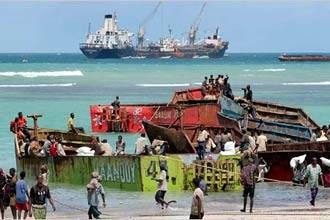
“I appeal to the Security Council to way in on this issue,” said Mr. Mahiga. “The single most divisive issue among the political groups in Mogadishu today is the timing of the elections as provided for [in] the Charter – whether to hold it in July or to defer them to a future date,” he added.
The Council called upon the transitional institutions to “ensure cohesion and focus on the completion of the transitional tasks.” It regretted decisions by the TFIs to extend their mandates unilaterally and urged them to refrain from further unilateral action.
The Council noted with concern that key transitional tasks remain outstanding and urged the TFIs to show results on the completion of those responsibilities before the end of the interim period. Priority should be on reconciliation, drafting of a new constitution and the delivery of essential services to the public.
Mr. Mahiga told the Council that the humanitarian situation in Somalia is approaching “catastrophic proportions” as a result of severe drought and the intensifying military campaign against insurgents, who have been preventing relief delivery to people in need in areas under their control.
He reported that the African Union peacekeeping mission in Somalia (AMISOM) and Transitional Federal Government forces had made significant and military and territorial gains against insurgents of the Al Shabaab group and urged the UN and the international community to help the TFG establish administrative structures and services in the liberated areas.

The Council strongly commended AMISOM and the Somali security forces for their progress in consolidating security in Mogadishu and recognised their sacrifices. It reiterated its full support for AMISOM and expressed its continued appreciation of the contribution of troops by the governments of Burundi and Uganda.
The Council “stresses the importance of predictable, reliable and timely resources for AMISOM in order for it to better fulfil its mandate.”
In his address to the Council, Somalia’s Prime Minister Mohamed Abdulahi Mohamed, pledged that his Government would do its best to restore stability in the country.
“We will do everything it takes to regain our status as a functioning State that protects its citizens, ends all forms of international piracy and extremism, promotes good governance, and produces a nation at peace with itself, and its neighbours,” said Mr. Mohamed.
Grave concern at continued instability in Somalia (Xinhua)
Need for a comprehensive strategy to encourage the establishment of peace and stability in Somalia through the collaborative efforts of all stakeholders
The UN Security Council on Wednesday reiterated its “grave concern at the continued instability” in Somalia and called for “a comprehensive strategy to encourage the establishment of peace and stability” in the Horn of Africa country.
The 15-nation Security Council, in a presidential statement adopted at the end of an open debate on the situation in Somalia, said that the instability in the African nation “has led to a multitude of problems, including terrorism, acts of piracy and armed robbery at sea off the coast of Somalia, hostage taking and a dire humanitarian situation.”
The Security Council “reiterates the need for a comprehensive strategy to encourage the establishment of peace and stability in Somalia through the collaborative efforts of all stakeholders,” the statement said.
Gerard Araud, the French UN ambassador who holds the rotating Security Council presidency for May, read the adopted presidential statement to the members of the UN body.
The Council “reiterates the importance of political outreach and reconciliation in Somalia, and stresses the importance of broad-based representative institutions reached through a political process ultimately inclusive of all,” the statement said.
Somalia’s long-standing 20-year civil war has resulted in the loss of thousands of lives and an ongoing drought threatens nearly 2.4 million people, according to UN estimates.
As the mandate of the Somali Transitional Federal Government ( TFG) is set to expire in August, the Council noted that the primary responsibility to achieve peace, security and reconciliation in the country belongs to Somalis themselves.
Meanwhile, the Council expressed regret at the decision taken by Somalia’s Transitional Federal Institutions (TFIs) to extend their mandates unilaterally and urged restraint from further similar action.
“The Security Council notes with concern that many core transitional tasks remain outstanding and urges the TFIs to demonstrate tangible results on the completion of these tasks before the end of the transition, prioritizing progress on reconciliation, the constitution and facilitating the delivery of basic services,” said the statement.
While acts of terrorism, piracy and armed robbery at sea off the coast of Somalia continue to threaten the country, the Council called upon “all opposition groups to lay down their arms and join the peace process.”
Somalia Prime Minister, Mohamed Abdulahi Farmajo’s Speech at UN Security Council
-Transcript-
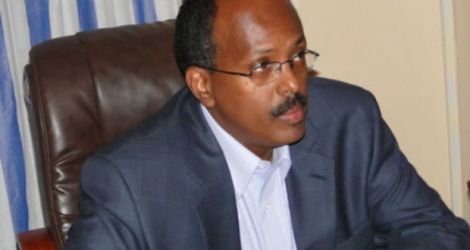 Mohamed Abdulahi Farmajo |
Mr. President, Distinguished Ambassadors, It gives me a great pleasure to appear before the Security Council today for a third time since I took office November last year. During my last two appearances, I have reported to you the achievements made by the Transitional Federal Institutions, the challenges we face and the way forward. I am delighted to continue that trend and once more provide you the latest updates and the challenges we face at this critical time.
I am also, however, here to listen to the constructive views of the UN Security Council members on how we can make progress beyond the Transition phase endingin August this year. As I previously mentioned in January and in March, my government’s five main priorities have been improving security, enhancing reconciliation, completing the transitional tasks (including the completion of our constitutional process), addressing humanitarian crisis, and promoting good governance.
Mr. President, Let me begin by offering my heartfelt gratitude and sincere appreciation once again for the ongoing support of the United Nations, the African Union (AU) and the International community to Somalia.
In particular, we are exceptionally grateful to the young men and women from Uganda and Burundi who make up the African Union troops and who offer the ultimate sacrifice for the safety and security of the Somali people. We salute and mourn those soldiers who died in Somalia. We offer our condolences to their friends, families and assure them that their loss will not be in vain.
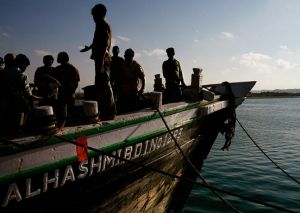
Our nation will be eternally grateful. Mr President, I am fully aware, that his Excellency, the Secretary General of the UN has recently reported to you on the key developments in Somalia; however, let me share with you our recent developments towards security.
My government continues to put the highest priority on security and as a result our troops and AMISOM forces are currently making tangible progress in reclaiming significant territory from extremist groups in Mogadishu.
Our troops are currently making visible progress in regions near the borders of Kenya and Ethiopia. They are gradually recapturing key districts and towns in Gedo and Jubba regions. In addition, The military offensive in the capital city has been very successful.
The centerpiece was the taking of the former Ministry of Defense from the extremists, a strategic objective and one which will prove a pivotal moment in this campaign. Ground is now being taken at an increasing rate, especially around Bondere and immediately south of Bakara Market in Howlwadag.
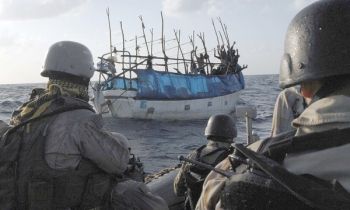
Together, the TFG and AMISOM forces continue to push the extremists further back each and every week. Such an offensive must be properly sustained and logistically supported and we implore the international community to step up their efforts in this area, so that the gains can be consolidated and sustained. We hope that the efforts of AMISOM forces in Somalia will show the world that African countries can solve their problems regionally.
We are immensely grateful for the leadership of the governments of Uganda and Burundi and we hope that other African leaders will also contribute to the cause of bringing peace and stability to Somalia.
Mr. President, Let me update you on the political developments in Somalia and once more state in no uncertain terms that my Government is your committed and credible partner in our efforts to stabilize Somalia. As you are all aware, the Transitional Federal Parliament (TFP) has unilaterally decided to extend its term for 3 years. The Transitional Federal Government believes the Parliament rushed to its decision without proper consultation among the other TFIs, particularly when considered that the transitional period for the TFIs shall end by August 2011.
The International community has also rejected the Parliament’s decision and raised both the legitimacy and the political wisdom of the legislature’s approach. From TFG’s perspective, a question of more practical importance is raised by the juridical relationships that bind the Transitional Federal Institutions to both Transitional Federal Charter and the 1960 Constitution. This has already occasioned differences of opinion between the Legislature and Executive branch of the government.
It is the opinion of my government (the Executive branch) that under the SIMUL STABUNT VEL SIMUL CADENT principle, the Transitional Federal Institutions shall cease to exist as of August 2011. In other words, both institutions are indissolubly connected from constitutional prospective. We would have wished to avoid the current political crisis within the Transitional Federal Institutions.
True, my government (the Executive branch) considers unconstitutional the behavior of the legislature for extending its mandate for additional three years.
The Legislature’s action is inconsistent and in contravention with the Transitional Federal Charter and the 1960 Constitution. Both state “The term of the Transitional Federal Parliament shall not be extended and any amendment with regards to the term shall not have effect with the tenure of the current legislature”.
Therefore, from the constitutional and legal perspectives, my government believes the current Parliament does not have the constitutional mandate to elect new President of the Republic. A post-August legally elected legislature will be the legitimate Parliament to elect a President.
We believe it is the responsibility of the executive branch of the government (TFG) to coordinate efforts of achieving an inclusive pre and post transitional arrangements, which we were in the process of concluding. The President of Somalia, Sheikh Sharif Sheikh Ahmed has asked the Parliament tore consider its decision. The Speaker has so far rejected the President’s proposition for decision with regard to the extension of Parliament tenure.
Mr President, The most disturbing consequence of this situation is the descent into political instability at precisely the time when the security situation is on the verge of a breakthrough and governance is taking effective strides forward. I and my government believe that, with such visible progress on the ground, this is the worst possible time to be distracted by untenable election processes and the divisive campaigning that will inevitably take place. The TFG also believes that the diversion of focus from governance and security to election campaigning will offer Al-Shabaab an opportunity it will take full advantage of.

We cannot offer these extremists such an open goal. It is our people, especially our youth, who will suffer most. Considered the state of war envisioned in article 68 of 1960 Somali Constitution, the TFG has discussed the issue at great length with all stakeholders, and therefore, we have proposed to the Parliament and to our international partners to consider extending the mandate of the Transitional Federal Institutions for additional 12 months.
The nation is at war with internal and external extremist forces and with a debilitating issue of piracy. The state of war envisioned in article 68 clearly provides extraordinary legal mandate for the Legislature and for the Executive branch to manage collectively the war efforts with exceptional powers, and therefore to allow the current progress to take hold and develop.
We believe that a further 12 months of political stability and security progress will create a chance for real and fair elections in which potentially the public can take part. This is our ambition and must surely be yours too. We believe this is in the wider interests of the Somali people. The question is how the TFI could secure legitimacy without undermining current progress with regard to security, stability and war efforts. We believe that the UN Security Council has role to play by upholding international legality.
The Somali people and the international community could not accept an Act by the Parliament that is clearly in violation of the (Somali) Constitution, which is a unilateral extension of its tenure. Mr President, In order to move forward I have appointed a ministerial committee, chaired by myself and requested the Parliament meet with us in order to settle our differences amicably and find an acceptable and mutually agreed consensus on the way forward.
We are still hopeful that the parliament will agree to a consultative meeting between the two institutions. As TFG has always believed the best way to solve our issues is to hold dialogue among Somalis, and we ask for your support in giving us the space and time to find our own political settlement. As you are all aware, the TFG did not participate in the consultative meeting, organized by the Special Representative for the UN Secretary General to Somalia Dr. Augustine Mahiga, in Nairobi last month. The TFG greatly values the role of the SRSG, the UN and our key international partners.
However, we believe that consultative meetings should be held inside Somalia and that Somalis should take the lead. We simply wished our voice to be heard. The TFG has long intended to hold a consultative meeting among all our stakeholders in Mogadishu and we have set the dates for this to take place from 11 – 16 June 2011. I am very pleased to report to you that Dr Augustine Mahiga has welcomed this meeting and has agreed the UN to sponsor it.
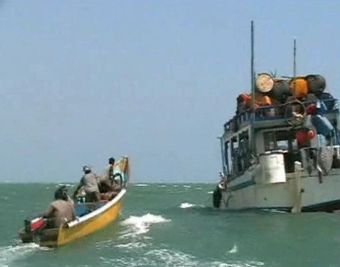
I have assigned a ministerial level committee to organize this meeting in consultation with the SRSG and all key stakeholders. We are very grateful Dr Augustine Mahiga’s commitment and the excellent work to bring peace and stability in Somalia. Mr President, I would also like to report to your Excellencies, that support from the Somali people is growing and they are fully behind these security successes. We are very grateful for this, as it is the first time in decades for a Somali government to receive such support from the people and this has come due to my government’s steady efforts towards the delivery of services and good governance. We also know that civil society groups are beginning to mobilize and gaining the confidence to make their voices heard.
I offer you three tangible examples of improving service delivery from the past two months. My government has, with donor support, and assistance from AMISOM, opened a new hospital: Martini Hospital has a total capacity of around 500 beds, and is already starting to treat and care for injured TFG soldiers and civilians with a range of illnesses and injuries. My government has taken over the running of a school attached to the newly established Jaziira military training camp on the outskirts of Mogadishu. Again, with AMISOM’s assistance, this school had been established for local children and those of soldiers in training.
My government has also established two other schools in Mogadishu to care for orphans and those whose parents are too poor to care for themselves. We have around 400 children receiving food, shelter and elementary education. The most exciting symbol of change, however, is the emergence of private property renovation and property investment. It may now just be confined to the road between K4 and the airport, but a new five floor hotel is being built, houses are being repaired, windows restored and road works undertaken. This is the surest sign of public confidence, as no private individual will spend their money if they think their efforts will return to rubble.
In addition, as I previously reported to the council, my government continues to provide service delivery to its people, such as street cleaning, repairing roads, street lighting, improving justice system, promoting human rights, and giving sense of hope to our citizens. We have recently relaunched our first National TV and National Newspaper called Dalka. Mr President, As I previously mentioned we are in the first line of defense against two evils, the scourge of piracy and the plague of terrorism. We feel that the pressure and the war against terrorism must be intensified until we eliminate all extremists on our soil.
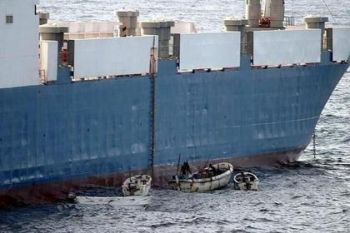
In light of the killing of Osama Bin Laden, my government has declared a state of high alert, due to credible information that Al-Qaeda and Al-Shabaab are planning revenge attacks, which could endanger or kill innocent people.
On 7 May 2011 Al-Shabaab Spokesperson confirmed planning revenge attacks and stated that they will intensify their terrorism activities. We need to defeat these aggressors at their source and this needs strong political will, cooperation and collaboration from us and resilient commitment and support from the international community.
We have to understand that the root cause and breeding ground of both terrorism and piracy is lawlessness coupled with poverty and unemployment. As I previously reported to your Excellencies, the scourge of piracy cannot be defeated in the high seas. Its solution lies with bringing back the rule of law on land in Somalia. We are very grateful for the work carried out by Jack Lang, the UN Secretary General’s Special Adviser on legal issues related to piracy, which has highlighted the urgent need to establish effective judicial capacity for piracy trials.
My government believes these courts should be in Somalia. My government strongly welcomes this and believes if the country has strong national government with effective coast guards within a secure EEZ we can help to reduce or even stop piracy. The Transitional Federal Government is grateful for the operations of the EUNAVFOR and many other international navies in our seas. My Government has started working with the UN agencies in regards to the stabilization and reconstruction of new areas coming under the control of the TFG both in Mogadishu and in the regions. This is very important and needs urgent support and attention from the international community. Another area in which we desperately need assistance is DDR.
We have witnessed a high level of young people defecting from Al-Shabaab. We do not have resources to provide the array of facilities, training and care to help them recover, resettle and rehabilitate their lives. The stories that we are getting from these young people are shocking and it requires not only commitment but leadership from the International Community so that we can win the war on terror not only by force, but by educating our young people and providing them the hope that they have been waiting for a very long time. Mr. President, In conclusion, we are gradually but effectively winning the support of the Somali population. My government is determined to help our people and I can assure you of our commitment to them and to you.
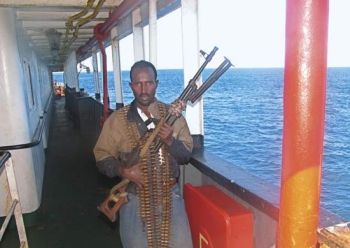
The interest of our nation and our people must come first. We know that we, the Government, must work tirelessly to meet the expectations made of us and lead by example in a transparent and effective governance manner. Defeating extremists from Somalia requires the same level of commitment to that of Afghanistan and Iraq. We will do everything it takes to regain our status as a functioning state that protects its citizens, ends all forms of international piracy and extremism, promotes good governance, and produces a nation at peace with itself, and its neighbors.
I would like to conclude with Secretary General’s comments in his recent report on Somalia: “The international community must keep its end of the bargain,” he states.
“The Transitional Federal Government urgently needs assistance for Mogadishu’s stabilization, recovery and reconstruction. If we reinforce the military gains, provide humanitarian relief and achieve political progress, we can set Somalia on course to greater stability and peace. If we fail, we risk a growing humanitarian crisis, a deteriorating security situation and a worsening threat to regional peace and stability.”
Thank you.
2 African Union peacekeepers killed in Somalia (ap)
An African Union commander says two AU peacekeepers were killed during a battle in the country's capital.
Maj. Gen. Nathan Mugisha said Thursday that his force killed several militants in the Mogadishu battle. He said three AU soldiers were also wounded.
AU mission spokesman Paddy Ankunda said al-Shabab militants who are trying to overthrow the government lost ground in the battle. AU peacekeepers are backing Somalia's fragile government.
Mogadishu residents dragged a corpse, which they said was an AU peacekeeper, through the streets.
The ongoing offensive is aimed at breaking insurgents' grip on large swaths of the country's south and central regions.
Somalia has not had a functioning government for more than 20 years.
Somali clashes leave 10 soldiers dead (PressTV)
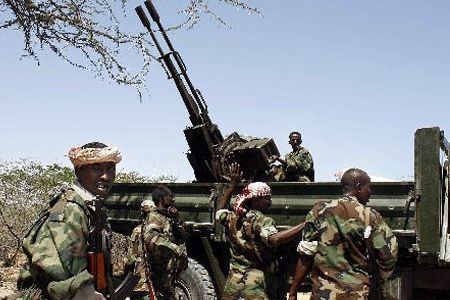 Somali government forces (file photo) |
Most of the displaced live in squalid conditions at makeshift camps in southern and central Somalia, according to the United Nations High Commissioner for Refugees.
At least 10 Somali soldiers have been killed after clashes broke out between al-Shabab fighters and the transitional government troops in the capital, Mogadishu. On Thursday, al-Shabab fighters attacked military bases of the transitional government troops in Mogadishu's southern districts of Hawlwadig and Hodan, a Press TV correspondent reported.
Clashes broke out in the aftermath of the attacks with the two sides exchanging heavy gunfire and barrages of mortar shells.
Scores of Somali soldiers were also injured in the clashes.
Somalia has not had a functioning government since 1991, when warlords overthrew former dictator Mohamed Siad Barre.
The Somali government has struggled for years to restore security but efforts have not yet yielded any result.
Nearly a million people have died following years of fighting between rival warlords and also due to the country's inability to deal with famine and disease.
There are more than 1.4 million internally displaced people (IDP) in Somalia. More than 300,000 IDP have been sheltered in Mogadishu alone. Most of the displaced live in squalid conditions at makeshift camps in southern and central Somalia, according to the United Nations High Commissioner for Refugees.
American Shabaab commander speaks at rally for Osama bin Laden in Somalia (lwj)
 Omar Hammami |
An American citizen who leads military forces for the al Qaeda-linked Shabaab in Somalia vowed to avenge the death of Osama bin Laden and said a global caliphate will soon be created. Omar Hammami’s recent public appearance confirms reports by The Long War Journal that denied he was killed by Somali forces in early March.
Hammami, who is also known as Abu Mansoor al Amriki (“the American”), spoke at a public rally in Afgoye, an area west of Mogadishu, the capital of Somalia.
Hammami and the other top Shabaab leaders are seen sitting in the open, unafraid of being targeted by Somali or African Union forces.
“We are all Osama,” Hammami told the crowd as he spoke at a podium, according to a translation of the speech, a portion of which was published by National Post. He also said that Shabaab and al Qaeda would continue their jihad to establish a global Islamic caliphate.
“Today, we remind the Muslims that the caliphate [Islamic rule] shall soon be reborn,” Hammani said. “May Allah accept our dear beloved sheikh [Osama bin Laden] and cause our swords to become instruments of his avenging.”
“We announce to America and to the world that Sheikh Osama bin Laden kindled the fire of jihad decades ago and in effect resistance is now of little value,” Hammami continued.
Hammami’s appearance in Afgoye has ended all questions of whether he was killed by Somali troops, as had been claimed by Somalia’s defense minister on March 8.
The Long War Journal reported on March 15 that Hammami had not been killed in recent fighting in Mogadishu. And in early April, Hammami released a nasheed, or Islamic song, on the Al Qimmah Islamic Network, a propaganda outlet for the al Qaeda-linked Shabaab, which mocked reports of his death. On that tape, Hammami said he desired to die in a US strike, like other top al Qaeda leaders.
“Send me a cruise like Maa’lam Adam al Ansari, And send me a couple of tons like Zarqawi, And send me a drone like Abu Laith al Libi, And Special Forces like Saleh Ali Nabhan,” the opening chorus of Hammami’s clumsy rap-nasheed begins.
Hammami has released similar propaganda in the past. In May 2010, Hammami appeared in another awkward rap-nasheed, titled “First Stop Addis.” In that rap, Hammami also claimed he sought to die a martyr.
“My number one goal… die a shaheed,” or martyr, he repeated constantly in his May 2010 rap.
Background on Omar Hammami
Hammami is a US citizen from Alabama who converted to Islam and then traveled to Somalia in 2006. Once in Somalia, he quickly rose through the ranks, and now serves as a military commander.
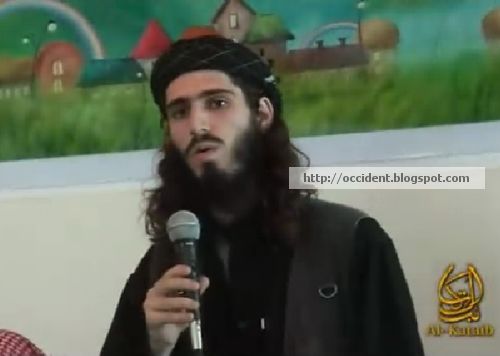 Another image of Omar Hammami aka Abu Mansour Al-Amriki from Daphne |
He is one of the many foreign commanders who hold senior leadership positions in Shabaab, which is al Qaeda’s affiliate in East Africa. Hammami is one of 14 people indicted by the US Justice Department in August 2010 for providing material support to Shabaab.
Hammami also began appearing in Shabaab propaganda tapes. In a tape released in May 2010, Hammami stressed that Shabaab’s war is not confined to Somalia but is global in nature.
“From Somalia and Shiishaan (Chechnya), from Iraq and Afghanistan, gonna meet up in the Holy Lands, establishing Allah’s Law on the land,” Hammami says in a chorus repeated throughout the song. In the tape, Hammami and others identify their enemy as the “salib,” or crusaders.
In February this year, the Somali government, backed by Ugandan and Burundian forces in the African Union, as well as Ethiopia, launched an offensive against Shabaab.
Somalia’s President, Sheikh Sharif Sheikh Ahmed, claimed on March 7 that Shabaab “is on the verge of collapse” after the terror group was driven out of several strongholds in the capital of Mogadishu as well as in the Gedo region on the Kenyan border.
The government claimed that Shabaab lost more than 500 fighters during the offensive. But the African Union has suppressed information about heavy casualties to its own forces.
On Mar. 4, it was reported that 53 African Union troops had been killed during the fighting.
Although no estimates on the number of Somali troops killed have been released, a US intelligence official told The Long War Journal that Somali forces have suffered heavy casualties during the current fighting.
Ahlu Sunna, Al Shabaab Battle in Galgudud
(Shabelle Media Network)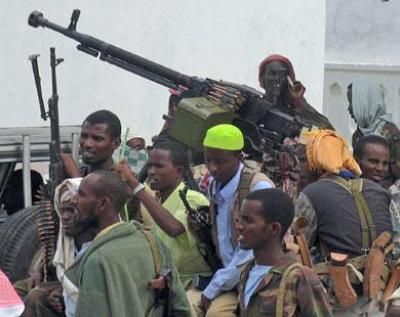 Somalia's Ahlu Sunnah Wal-Jama |
Heavy battles between Somalia's Ahlu Sunna Waljama ASWJ and Al shabaab fighters on Thursday broke out in parts of Galgudud region in central Somalia.
The two warring sides have used both heavy artillery and light weapons, local residents said.
Most of the combat rocked the villages of Dhagahley and Hayale as fighters loyal Al shabaab movement attacked military bases manned by Ahlu Sunna there.
At least 4 people, mainly fighters, have been slain and dozens more injured in the fighting Thursday.
The spokesman of Al shabaab for military operations, Sheikh Abdi-aziz Abu Mus'ab told that the local media they their fighters had the upper hand during the battle.
Abu Mus'ab claimed that they inflicted heavy losses on their political antagonist fighters of Ahlu Sunna.
For his part, Abdi Bashi Adam, the deputy district commissioner of Guri El under Ahlu Sunna said in an interview with Shabelle Media Network that Ahlu Sunna fighters in the village of Dhagahley came under ambush attack from Al shabaab.
Mr. Adam said they managed to repulse what he called the adversaries of the Somali people.
SOMALIA IS A DECLARED AND DESIGNATED NUCLEAR FREE ZONE:
UK-USA-FRANCE MUST STAY OUTSIDE THE 200nm TERRITORIAL WATERS WITH THEIR NUKE-SUBS
Jinxed nuclear submarine’s malfunction could have killed its entire crew (HeraldScotland)
The Royal Navy’s latest £1.2 billion nuclear submarine, HMS Astute, has been towed back to base after a malfunction which could have killed the entire crew, the Sunday Herald can reveal. The hi-tech stealth vessel was taken to the Faslane Naval Base on the Clyde late last Friday when it suffered “a technical issue with hydraulics”, according to a Ministry of Defence (MoD) source.
“This needs to be fixed to make sure it can dive properly,” the source said. “It could take days, or it could take weeks.”

Experts say that the boat’s hydroplanes, which enable it to dive or surface, are hydraulically controlled. If they fail, the boat could be lost, along with its entire crew of 98. The ill-fated HMS Astute is infamous for being the scene of a fatal shooting a month ago when it was docked in Southampton, and for accidentally running aground off the Isle of Skye last October.
The boat has been plagued by a series of other mishaps, including a fire, being hit by a falling ramp and problems with its toilets. HMS Astute left Faslane on Wednesday for sea trials, but returned soon after just two days. One insider told the Sunday Herald that the captain, Commander Iain Breckenridge, had “no confidence in the performance of the vessel”.
The nuclear consultant, John Large, who has advised governments on submarine safety, pointed out that the hydraulics that controlled the hydroplanes were “a fundamental safety system that can’t be ignored”. He said: “If you don’t have the hydraulics, the boat could sink with all hands on board. It’s a serious problem.”
The danger that submarines like HMS Astute could have difficulties surfacing was highlighted in a secret report by the MoD’s own nuclear safety watchdog. Commodore Andrew McFarlane, the chief defence nuclear safety regulator, warned that there was a “risk of multiple fatalities resulting from loss of depth control”.
His report was released under freedom of information law with large sections blacked out. But researchers discovered that the censored text could be read simply by cutting and pasting it into a new document. This revealed that British submariners were more likely to drown than their American counterparts if the reactor that powered their boat failed while they are under water. British submarines “accept a much lower reliability from the main propulsion system” and the back-up system “will not provide sufficient dynamic lift”, McFarlane said.

HMS Astute is the first of seven “state-of-the-art” Astute class submarines, which are being built at Barrow in Cumbria. They have been beset by delays and budget overruns, and could end up costing over £10bn.
The Royal Navy operates 10 other nuclear-powered submarines out of Faslane, including four Vanguard class boats, which carry Trident nuclear missiles.
The Sunday Herald disclosed in April that one of them, HMS Vengeance, had to cut short a training exercise in the North Atlantic when its propeller became blocked with debris.
An MoD spokeswoman said: “We do not routinely comment on submarine movements.” Rawlings says Somalia peace plans must be properly implemented.
(GNA)
The African Union High Representative for Somalia, former president Jerry John Rawlings, says the lack of proper implementation plans have in the past hindered the success of peace agreements made on the Somalia crisis.
 African Union High Representative for Somalia, former |
He said such plans also lacked the necessary resources, arbitration and monitoring mechanism to ensure that the accord was fully implemented.
A statement issued in Accra by the Office of the former president said he was speaking at the 10th meeting of the African Union Panel of the Wise in Addis Ababa on Thursday on the theme, “Building Peace in Somalia: Lessons Learned, Constraints and Challenges.”
President Rawlings said: “The reconciliation conferences were often hijacked by individuals who had no real connection on the ground and who were bent on keeping the real actors out of the process.”
As a result, the reconciliation conferences were turned into power-sharing conferences and political wrangling among the top leaders in the successive Transitional Governments became the norm.
Former President Rawlings said “as Africans, we must speak with one voice and redouble our efforts to bring the Transitional Federal Institutions to agree on actions to prepare for the elections, ensure that the transitional tasks will be implemented in the new transition and that the TFIs (Transitional Federal Institutions) adopt an overall road map to end the transition that started in 2004”.
The AU High Representative called on the United Nations and other organisations assisting with the peace process to double their efforts.
He expressed regret that though Somalia was facing huge humanitarian crises brought about by a prolonged drought the support coming in was not significant enough to avoid a major human catastrophe.
BACKGROUND
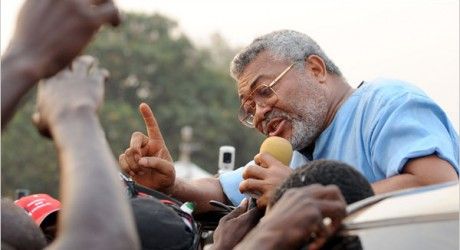 AU Panel of the Wise May 12-13 |
The 10th meeting of the AU Panel of the Wise took place from May 12-13 to deliberate on ongoing conflict situations in Africa.
The Panel of the Wise is one of the pillars of the African Peace and Security Architecture whose mandate is to advise the Chairperson of the AU on matters related to conflict prevention and resolution.
The Panel convenes regular brainstorming meetings with the AU Commission, AU mediators, envoys, as well as various experts, to take stock of ongoing efforts, identify and learn lessons from AU’s experiences at large.
The discussions on Somalia would primarily focus on assisting President Rawlings and the African Union Mission on Somalia (AMISOM) in furthering the implementation of the Djibouti Peace Process for Somalia.
General Arnold Quainoo and Mr. Herbert Mensah accompanied President Rawlings.
Somali political bickering undermines peace process – UN envoy (UN)
Political divisions between Somalia’s transitional Government and interim Parliament have undermined the momentum of the country’s peace process, a United Nations envoy said today, calling for a concerted regional and international effort to help break the stalemate.
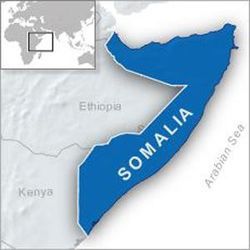
“We had reached a stage where we thought we had provided a very good momentum through the Djibouti agreement two years ago… we had agreed in Djibouti that the transitional has to come to an end in August,” Augustine Mahiga, the Special Representative of the Secretary-General for Somalia, told the UN News Centre.
“The problem is that neither Parliament nor the Government want change. And that is the crux of the paralysis,” said Mr. Mahiga.
Somalia’s transitional parliament voted in February to extend its term for three years after the end of the transitional period, a move rejected by the Transitional Federal Government (TFG), which has instead proposed extending the interim period for one year, saying it wanted to try to enhance political stability and security.
Earlier this week, the Security Council called upon Somali’s transitional federal institutions (TFIs) to “ensure cohesion and focus on the completion of the transitional tasks.”

It regretted decisions by the TFIs to extend their mandates unilaterally and urged them to refrain from further unilateral action.
“What we are trying to do in the Security Council and [other] stakeholders in the region, the African Union and IGAD [regional Intergovernmental Authority on Development] is to heal this paralysis and provide a fresh momentum to push the peace process forward by agreeing on the necessary benchmarks for the end of the transition,” said Mr. Mahiga.
The benchmarks include political outreach to political factions and Somalia’s semi-autonomous regional administrations to foster dialogue and reconciliation, and the drafting of a new constitution for the Horn of Africa country, which has lacked a fully functioning national government and has been wracked by factional warfare since 1991.
“The Government has not succeeded in undertaking any political reforms that would inject new momentum into the process,” said Mr. Mahiga. “At the moment the political will is lacking.”
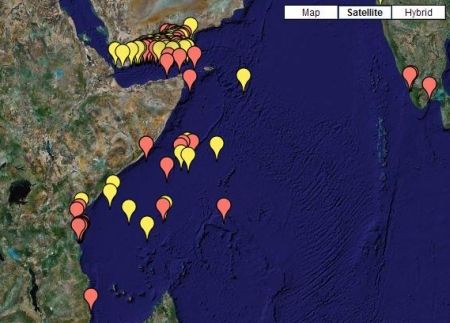 Map shows pirate bases at Somalia |
“What I need to do with the help of the Security Council, IGAD and the African Union is to try first of all to create congenial conditions for the two institutions… to see the extent to which we can develop consensus to hold the elections in August or to have them deferred,” he said.
He said the Security Council is expected to meet Somalia’s leadership and representatives from the AU and IGAD in the Kenyan capital, Nairobi, during its forthcoming mission to Africa, in an effort to break the deadlock.
Mr. Mahiga said that TFG forces and allied militia have, with the support of the troops of the AU mission in Somalia (AMISOM), made significant territorial gains against Al Shabaab insurgents in the capital, Mogadishu, as well as in the central, western and southern areas.
“My worry is that this political bickering may adversely affect this very significant military gains on the ground,” he said.
He also stressed that Somalia’s semi-autonomous regions could form the basis for a viable federal government.
“This needs to be brought into the political dialogue for an agreed framework of federalism, devolution, decentralisation,” he said. “Both the Government and Parliament have not addressed this issue,” he said.
Mr. Mahiga voiced great concern over the humanitarian situation in Somalia, saying it was “worse that it has ever been”, with more than 75 per cent of livestock having perished as a result of the prevailing severe drought, and people moving from one corner of the country to another and across the borders into neighbouring countries in search of food and water.
“The international community has not given enough resources for food and other basics. This is our cry to the international community,” said Mr. Mahiga.
An estimated 2.4 million people – or about a third of the country’s 7.2 million people – are in need of relief aid as a result of drought and two decades of conflict.
The Naval Lies, Which The People Experience Every Day Also In Somalia, Cost Lives !!!!
THE NATO MISSION: PROTECTING CIVILIANS BY KILLING THEM !
NATO ship leaves 63 refugees to die in the Mediterranean (Guardian)
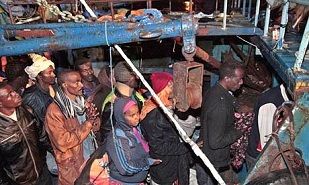
Dozens of African migrants were left to die in the Mediterranean Sea after a series of European and NATO military units apparently ignored their cries for help, the Guardian has learned. A boat carrying 72 passengers, including several women, young children and political refugees, ran into trouble in late March after leaving Tripoli for the Italian island of Lampedusa.
Despite alarms being raised with the Italian coastguard and the boat making contact with a military helicopter and a NATO warship, no rescue effort was attempted. Nearly all of those on board eventually died from thirst and hunger after their vessel was left to drift in open waters for 16 days.
“Every morning we would wake up and find more bodies, which we would leave for 24 hours and then throw overboard,” said Abu Kurke, one of only nine survivors.
“By the final days, we didn't know ourselves ... everyone was either praying, or dying.” International maritime law compels all vessels, including military units, to answer distress calls from nearby boats and to offer help where possible.
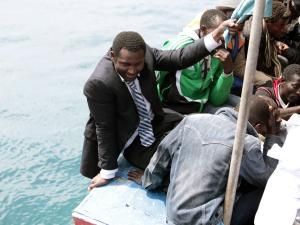
Refugee rights campaigners have demanded an investigation into the deaths, while UNHCR, the United Nation's refugee agency, has called for stricter cooperation among commercial and military vessels in the Mediterranean in an effort to save human lives. “The Mediterranean cannot become the wild west,” said spokeswoman Laura Boldrini. “Those who do not rescue people at sea cannot remain unpunished.”
Her words were echoed by Father Moses Zerai, an Eritrean priest in Rome who runs the refugee rights organisation Habeshia, and who was one of the last people to be in communication with the migrant boat before the onboard satellite phone ran out of battery.
“There was an abdication of responsibility which led to the deaths of over 60 people, including children,” he claimed.
“That constitutes a crime, and that crime cannot go unpunished just because the victims were African migrants and not tourists on a cruise liner.”
This year's political turmoil and military conflict in North Africa has fueled a sharp rise in the number of people attempting to reach Europe by sea, with up to 30,000 migrants believed to have made the journey across the Mediterranean over the past four months.
Large numbers have died en route; last month alone, more than 800 migrants of different nationalities who left on boats from Libya never made it to European shores and are presumed dead. The boat of 72 set sail from Tripoli on March 25, carrying 47 Ethiopians, seven Nigerians, seven Eritreans, six Ghanaians and five Sudanese migrants. Twenty were women and two were small children, one of whom was just one year old. The boat's Ghanaian captain was aiming for the Italian island of Lampedusa, 290 km north-west of the Libyan capital, but after just 18 hours at sea the small vessel began running into trouble and losing fuel.
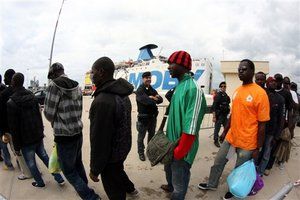
Using witness testimony from survivors and other individuals who were in contact with the boat's passengers during its doomed voyage, the Guardian has pieced together what happened next. The account paints a harrowing picture of a group of increasingly desperate migrants condemned to death by a combination of bad luck, bureaucracy and the apparent indifference of European military forces who had the opportunity to attempt a rescue.
The migrants initially used the boat's onboard satellite phone to call Father Zerai in Rome, who in turn contacted the Italian coastguard. The boat's location was narrowed down to about 100 km outside of Tripoli, and coastguard officials assured Father Zerai that the alarm had been raised and all relevant authorities had been alerted to the boat's situation.
Soon afterwards a military helicopter with the word “army” on its side appeared above the boat. The pilots, who were wearing military uniforms, lowered down bottles of water and packets of biscuits and gestured to passengers that they should hold their position until a rescue boat came to help. The helicopter then flew off, but no rescue boat ever arrived.
No country has yet admitted to sending the helicopter that made contact with the migrants.
A spokesman for the Italian coastguard said: “We advised Malta that the vessel was heading towards their search and rescue zone, and we issued an alert telling vessels to look out for the boat, obliging them to attempt a rescue.” The Maltese authorities denied they had any involvement with the boat. After several hours of waiting, it became apparent to those on board that help was not on the way.
The vessel had only 20 litres of fuel left, but the captain told passengers that Lampedusa was close enough for him to make it there unaided.
It was a fatal mistake. By March 27, the boat had lost its way, ran out of fuel and was drifting with the currents. “We'd finished the oil, we'd finished the food and water, we'd finished everything,” said Kurke, a 24-year-old migrant who was fleeing ethnic conflict in his homeland, the Oromia region of Ethiopia. “We were drifting in the sea, and the weather was very dangerous.”
At some point on March 29 or 30, the boat was carried near to a NATO aircraft carrier — so close that it would have been impossible to be missed. According to survivors, two jet planes took off from the ship and flew low over the boat while the migrants stood on deck and held the two starving babies aloft into the air.
But from that point on no help was forthcoming. Unable to manoeuvre any closer to the giant aircraft carrier, the migrants' boat eventually drifted away. Shorn of supplies, fuel or means of contacting the outside world, they began succumbing one by one to thirst and starvation.
The Guardian has made extensive enquiries to ascertain the identity of the NATO aircraft carrier, and has concluded that it is likely to have been the French ship Charles de Gaulle, which was operating in the Mediterranean on those dates. French naval authorities initially denied that the ship was in the region at that time. After being shown news reports which indicated this was untrue, a spokesperson declined to comment.
A spokesman for NATO, which is coordinating the military action in Libya, said that it had not logged any distress signals from the migrant boat and had no records of the incident. “NATO units are fully aware of their responsibilities with regard to the international maritime law regarding safety of life at sea,” said an official. “NATO ships will answer all distress calls at sea and always provide help when necessary. Saving lives is a priority for any NATO ships.”
For the migrants, the failure of the NATO ship to mount any rescue attempt proved fatal; over the next 10 days, almost everyone on board died. “We saved one bottle of water from the helicopter for the two babies, and kept feeding them even after their parents had passed [away],” said Kurke, who survived by drinking his own urine and eating two tubes of toothpaste. “But after two days, the babies passed too, because they were so small.” On April 10, the boat washed up on a beach near the Libyan town of Zlitan near Misrata.
Of the 72 migrants who had embarked at Tripoli, only 11 were still alive and one of those died almost immediately on reaching land. Another survivor died shortly afterwards in prison, after Qadhafi forces arrested the mi...
[Message clipped] View entire message
Articles for May 13, 2011 | Articles for May 14, 2011 | Articles for May 15, 2011





Salem-News.com:
Terms of Service | Privacy Policy

All comments and messages are approved by people and self promotional links or unacceptable comments are denied.
[Return to Top]
©2026 Salem-News.com. All opinions expressed in this article are those of the author and do not necessarily reflect those of Salem-News.com.